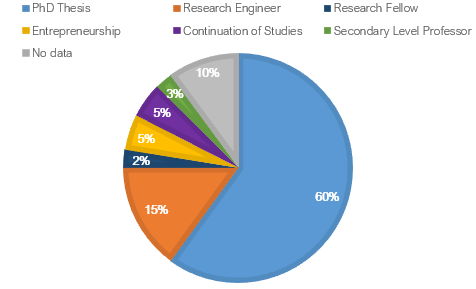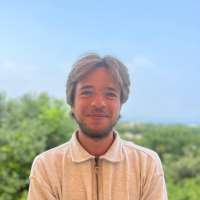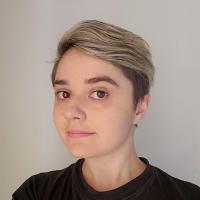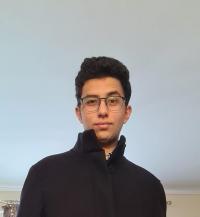Professional outcomes
This master puts you up for a career in academia, through a high-quality PhD program or in private R&D positions in a wide range of areas including neuroscience, cognitive science, computer science and applied mathematics.
Mod4NeuCog provides its students with an excellent opportunity to showcase their motivation and talent and to develop a network including some of the best researchers locally or abroad, paving the way for an academic career at Université Côte d'Azur and beyond.
Most of our graduates continue with a PhD program (57%), most of them in France. 18% start a position in the academic field, as research fellows or engineers in laboratories.
Employment sectors of our graduates (2020-24)

Publications
Some of our Master students published some scientific papers during their internships. You can find the list of publications on the NeuroMod Institute website.
Testimonials from our previous students

I joined the master in september 2022 because I was interested in its interdisciplinary features and because of its high preparatory level. I was positively impressed by the other students, a heterogeneous group coming from different fields (mathematics, computer science, cognitive science, physics, biology etc.) and different countries around the world. Together we underwent a preparatory period where basic subjects (mathematics, programming, neuroscience) were presented. Later on in the master, I really appreciated the flexibility of elective courses that can be selected. Thanks to this, I could focus on the topics I was more interested, and create independently my own study plan. Considering the two years of students, we count around 20-25 people enrolled in the master. This aspect is fundamental in the sense that the relation with the professors becomes personal and friendly, we are enabled and encouraged to interact and participate during class. Learning is dynamic and natural! In the last year of my master I was included in a very ambitious and novel project where a private company collaborates with the NeuroMod Institute in order to build processors out of neurons, instead of regular metal-hardwared ones. I could do this because of the very good research that the professors involved in the master carry out, which attracts competitive and innovative research lines, that can be joined by students during their internships!

My background is mostly in Biology, but I've always had an attraction to programming and computer science. After working on Bioinformatics during an internship in my Bachelor of Life Science, I wanted to apply for a master's program that could combine Neuroscience and Computer Science.
I wasn't sure if my background would be enough to be selected, but the first months of year 1 were there to strengthen my skills and proved to me that I also had things to share with other students. Since we were a small group (13 students), we worked together on our strengths and weaknesses. I don't think I could have worked that way in a big class.
It exceeded my expectations with the first internships. Courses are a good way to understand the content of our Master, but I truly believe that we learned more through the multiple experiences it provides.
Thanks to my supervisors, I accomplished projects that I didn't know I was capable of. And our professors are the best examples for promoting interdisciplinarity in Research.

My experience at the MSc M4NC has been lifechanging for the best. First of all, being awarded the IDEX Scholarship was the incentive that I needed to begin my adventure/experience in France, since it helped considerably to alleviate my financial situation, but most importantly, it was a significant acknowledgement of my previous academic accomplishments during my BSc in Physics. The courses, although challenging at times, are interesting and well-prepared to gain a broad yet practical understanding of core and trending neuroscience concepts that help you to find your way in the field. These courses are also extensively interdisciplinary, and it helps to easily find connections between the different topics presented in mathematical, biological, and cognitive courses, which is one of the most attractive aspects of the program. Personally, being encouraged to collaborate with our classmates, coming from very diverse academic and cultural backgrounds, during Bootcamp to help each other understand the subjects and assignments has been a unique experience that, as intensive as it was, helped to create a bonding environment on which I gained valuable experiences with interdisciplinary peers, and created valuable friendships.

Philip Zakhariadis-Awad (Greece) - First year student 2023-24
My name is Philip Zakhariadis-Awad, I am a Biology graduate studying in my first year at the MSc Modelling of Neuronal and Cognitive Systems, and I am strongly satisfied with the program. One of the things that have made quite an impression on me about the master's program was the strong emphasis on mathematical tools and programming, which of course in hindsight makes a lot of sense given just how much these tools are used in all research subjects that concern neuroscience, cognitive science, and other related fields. This of course means that the program requires, especially at its beginning, diligent and systematic studying, and what has helped me the most is cooperating in this regard with my peers, who all come from vastly different disciplines, so we were able to help each other bridge the gaps in our knowledge. When the time came for our electives and choosing the initial mini-project, that is exactly when I realized the worth of the Master's, because my courses were extremely interesting, even if at times hard, and the available opportunities for mini-projects are great for most, if not all students' academic interests - and I'm saying this knowing that I am aiming for a PhD in social sciences after this! In a few words, for those who are interested in fortifying their mathematical and compsci foundations with topics in neuroscience and cogsci or vice versa, this program is exactly for you.
















